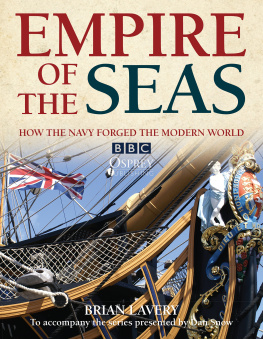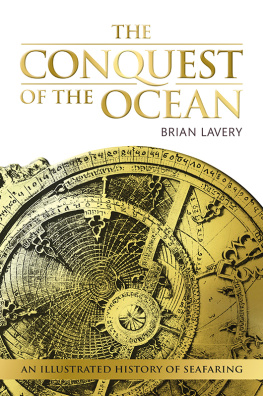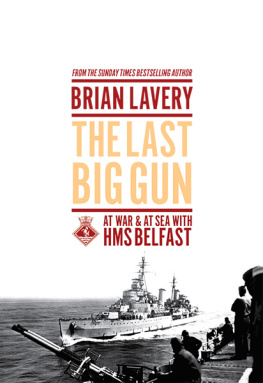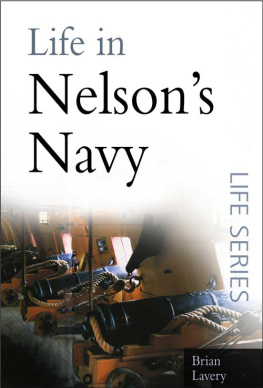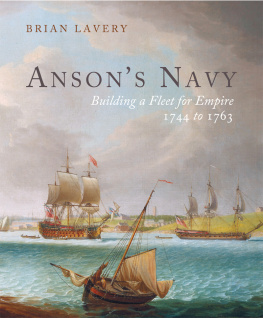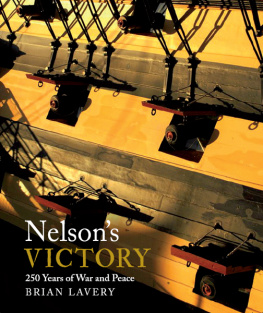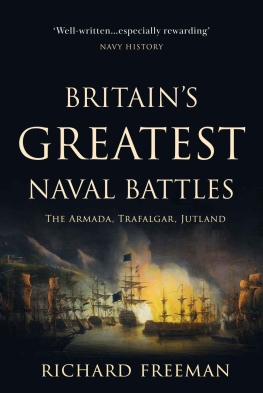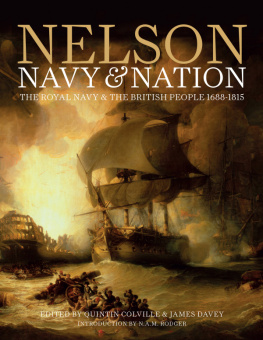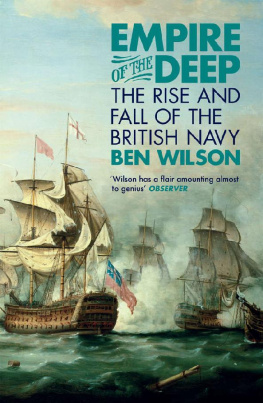Praise for Empire of the Seas
Elegantly written authoritative and accessible Nautilus International Telegraph
Excellent the Royal Navy has provided Great Britain with many of its heroes, including Drake and Nelson. In addition to them, hundreds of thousands of men served with the fleet over the centuries. This is the story of the effect they had on the world. Nautical magazine
The history of the Royal Navy is a long and illustrious one Brian Lavery, an acknowledged expert in his subject, has done a great job in distilling so much information into [one] book and in a very approachable and readable way. Ancestors magazine
This wonderful book tells the story of how the Royal Navy became the most powerful navy in the world and justifiably inspired the unofficial national anthem, Rule Britannia the author brings to life the heroics of Drake, Hawkins, Nelson and Rodney. The Good Book Guide
If a Whitehall mandarin, with his hand on the tiller of defence spending, is planning to while away a few hours this weekend with a good book, then this is the one he should choose to read. For he will be reminded that in this age of never-ending conflict and strife the Great which was attached to our nations name largely came about because of our Royal Navy [a] compelling tome Western Morning News
The text provides an overview of the Royal Navy from the defeat of the Spanish Armada to the First World War. However, some of the more interesting material looks at what it was like to be a naval seaman. What did the crew of a 15th-century ship actually do? What rations would a sailor on an 18th-century tall ship receive? It is details like this that help us to understand and appreciate our naval ancestors lives a splendid volume. Family History Monthly
The accessibility of Empire of the Seas is perhaps its greatest strength. Whether academic or keen amateur there is something for everyone. Empire of the Seas is an engaging and meticulously researched work, which is highly recommended. Naval Historical Collectors & Research Association

OSPREY PUBLISHING
Bloomsbury Publishing Plc
PO Box 883, Oxford, OX1 9PL, UK
1385 Broadway, 5th Floor, New York,
NY 10018, USA
E-mail:
www.ospreypublishing.com
OSPREY is a trademark of Osprey Publishing Ltd
First ebook publication in 2012
This electronic edition published in 2018 by Osprey Publishing Ltd
Text Brian Lavery 2009
Volume Conway, 2012
Brian Lavery has asserted his right under the Copyright, Designs and Patents Act, 1988,to be identified as Author of this work.
The BBC logo is a trade mark of the British Broadcasting Corporation and is used under licence.
BBC logo BBC 1996
All rights reserved. No part of this publication may be reproduced or transmitted in any form or by any means, electronic or mechanical, including photocopying, recording, or any information storage or retrieval system, without prior permission in writing from the publishers.
British Library Cataloguing-in-Publication Data
A catalogue record for this book is available from the British Library.
ISBN: PB: 9781472835604
eBook: 9781472835598
To find out more about our authors and books visit www.ospreypublishing.com. Here you will find extracts, author interviews, details of forthcoming events and the option to sign up for our newsletter.
ABOUT THE AUTHOR
B rian Lavery is a Curator Emeritus at the National Maritime Museum, Greenwich, and a renowned expert on the sailing navy and the Royal Navy. In 2007 he won the prestigious Desmond Wettern Maritime Media Award, given to an individual considered to have made a significant contribution to publicising the importance of the UKs maritime interests. His naval writing was further honoured in 2008 with the Society of Nautical Researchs Anderson Medal. A prolific author, Conway books by Brian Lavery include the classic reference Nelsons Navy as well as Jack Aubrey Commands, The Island Nation, Churchills Navy, Churchill Goes to War, In Which They Served, The Frigate Surprise, We Shall Fight on the Beaches and Hostilities Only. His most recent work is a ground-breaking three volume study of the Royal Navys lower deck, published as Royal Tars, Able Seamen and All Hands. Brian Lavery was Series Consultant for the BBC series Empire of the Seas.
ACKNOWLEDGEMENTS
T his work is influenced by the recent generation of historians, including the late David Lyon and David Syrett, who straddled the eighteenth and the twentieth centuries. Museum personnel include Roger Knight, Simon Stephens, Robert Blyth and Rina Prentice of the National Maritime Museum; Jenny Wraight and Iain Mackenzie, of the Naval Historical Library, and Campbell MacMurray and the late Colin White of the Royal Naval Museum. Academics include Robert Prescott of St Andrews, Eric Grove of Salford, Nicolas Rodger of All Souls Oxford, Andrew Lambert of Kings College London, Pat Crimmin of Royal Holloway College and many more.
Much material is from manuscripts in the National Archives, British Library and National Maritime Museum; thanks are due to the staffs of these institutions. For printed books I have used the British Library and the National Maritime Museum, and especially the London Library with its huge range of books for borrowing. Finally my gratitude is due to John Lee at Conway for asking me to write the book and to Alison Moss for editing it so thoroughly and often against the clock as schedules changed rapidly.
INTRODUCTION
T he Royal Navy of today has far more fire power and reach than it ever had in the days of Drake, Nelson, Fisher or Churchill. It now has eighty-eight ships compared with a thousand in the early 1800s and eight thousand during the Second World War, but its smallest patrol boat could take on and destroy the whole of Nelsons fleet, staying upwind and out of range and using its 30mm gun to destroy or incinerate the wooden hulls of its opponents, one by one. The fleet has radar to find the enemy in fog or darkness and sonar that might detect a submarine a hundred miles away. It has aircraft that can find and attack an enemy over hundreds of miles, on land, sea or air. Beyond that its Trident submarines have the awesome energy of thermonuclear weapons, with far more destructive power than all the forces of the Second World War and the ability to destroy most of the worlds great cities. Even though it is a long way behind the United States Navy in size and power, and it no longer enjoys the enormous public respect that it once did, it is still a hugely powerful and infinitely flexible force, with ships, aircraft and marines able to operate on, under and above the sea as well as on land.
Yet it was the relatively feeble and vulnerable navies of Drake, Blake, Pepys, Anson and Nelson that became the expression of British power and the object of public affection, and changed Britain and the world in all sorts of subtle and unexpected ways. Nelsons ships were made of wood, highly inflammable and likely to break up very quickly on rocks. Their large crews were often the unwilling victims of the press gang rather than the highly motivated volunteers of today. They could see nothing beyond the horizon or below the surface of the water. Once out of sight of land they had no contact with higher authority ashore. The range of their guns was a few hundred yards at best, and the marines could never move too far inland for fear of losing contact with their parent ships. Their technology might seem primitive from the decks of a modern aircraft carrier, but their ships were the most advanced machines of their day, requiring vast amounts of skill to operate them effectively. For all their faults they were more successful than the ships and crews of other nations, and came to dominate the seas.

